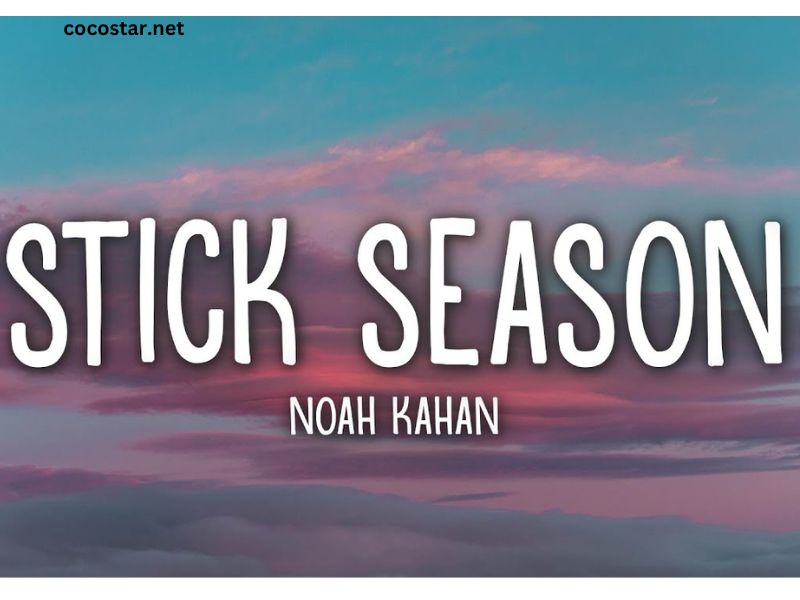Noah Kahan’s “Stick Season” has become an anthem for many listeners, captivating hearts with its raw, emotional lyrics and powerful storytelling. The song not only touches on themes of longing, loss, and personal growth, but it also paints a vivid picture of life in a small town, where seasons change and relationships shift in the wake of time. In this article, we will take an in-depth look at the “Noah Kahan Stick Season Lyrics,” analyzing the meaning behind the words, the themes explored in the song, and why it resonates so deeply with its audience. Whether you’re a fan of Kahan’s music or new to his work, this exploration will give you a deeper understanding of the song and the artist behind it.
Noah Kahan’s Rise to Prominence
Before diving into the lyrics themselves, it’s important to understand the artist who created “Stick Season.” Noah Kahan, a Vermont-native singer-songwriter, gained recognition through his powerful lyrics and unique fusion of folk, indie, and pop influences. His ability to blend poignant lyrics with acoustic-driven melodies has made him a standout in the music industry, earning him a loyal fan base and widespread acclaim.
Kahan’s style is often characterized by its introspective nature. His songs delve into themes of mental health, relationships, and the complexities of growing up. “Stick Season,” one of his most popular songs, is no exception. The track, like many of Kahan’s works, showcases his exceptional ability to translate personal experiences into universally relatable narratives.
“Stick Season” Lyrics Breakdown
The title “Stick Season” refers to the period between fall and winter when the trees have lost their leaves, leaving behind bare branches, or “sticks.” In many ways, this season symbolizes a period of transition and emotional bare-bones honesty. Kahan uses this natural metaphor to explore the disintegration of relationships and the feeling of emotional emptiness that can come with change.
Verse 1: The Beginning of Change
In the first verse of “Stick Season,” Kahan sings about the subtle yet powerful changes occurring in his life. He mentions how things were simpler in the past and how time, with its relentless passage, gradually alters everything.
“And I hate the winter, but I’ll be in the dark For all my life, I’ve been a stick in the mud, And I don’t wanna leave, but I’ll never stay.”
The opening lines set the tone for the song’s emotional journey, highlighting the tension between staying stuck in familiar places (both physically and emotionally) and the inevitability of change. Kahan’s use of imagery, such as the “stick in the mud,” reflects his feelings of stagnation, while the reference to being “in the dark” suggests uncertainty about the future.
Chorus: The Heart of the Song
The chorus of “Stick Season” is perhaps the most memorable part of the song, capturing the essence of what it means to feel torn between different seasons of life. In this part of the song, Kahan expresses his longing for something he can’t have — the past, a lost connection, or a time when things were simpler.
“And I’ll be here, in the stick season Frozen in the snow, lost in the past.”
The “stick season” in the chorus serves as a metaphor for emotional numbness. The winter imagery reinforces feelings of coldness and isolation, while the mention of being “lost in the past” speaks to a desire to return to something that is no longer attainable.
Verse 2: Emotional Conflict and Growth
As the song progresses, Kahan delves deeper into the emotional complexities of navigating through personal growth and loss. In this verse, he confronts the reality that he must leave behind the familiar but stagnant aspects of his life to move forward.
“I’ll try to move on, but I don’t know how When every little thing reminds me of you now.”
This line speaks to the challenge of moving on after a breakup or emotional setback. Kahan’s vulnerability shines through as he articulates how difficult it is to let go of someone or something that once meant so much, even as time continues to push him forward.
Bridge: A Moment of Reflection
The bridge of the song introduces a quieter, more introspective moment, allowing Kahan to reflect on the theme of nostalgia and longing for something that has passed.
“I was only ever good at staying put Now I’m stuck in the stick season.”
Here, Kahan admits his struggle with change and self-discovery. He acknowledges that his tendency to stay in one place — physically and emotionally — has prevented him from embracing growth and moving forward. This line resonates with listeners who have experienced the same internal conflict, making it one of the most relatable moments in the song.
Outro: Acceptance and Closure
The outro of “Stick Season” brings a sense of closure to the song. Kahan’s final lyrics express a mixture of resignation and acceptance, understanding that change is inevitable and that moving forward is a part of life.
“So I’ll make my peace with it, I’ll learn to love the snow.”
The resolution in the outro suggests that Kahan is beginning to accept the harsh realities of life and is learning to embrace the emotional “winter” he once dreaded. This is a powerful message about personal growth — even in the cold, barren moments, there is room for change and renewal.
The Themes of “Stick Season” Lyrics
At its core, “Stick Season” is a song about transitions — the changing seasons of life, the evolution of relationships, and the inevitability of time. It touches on universal experiences such as:
- Loss and Nostalgia: The lyrics explore the feeling of losing something dear and the longing to return to a time when life felt easier. The theme of nostalgia is central to the song, as Kahan reflects on the past and the emotional weight it carries.
- Emotional Stagnation: The “stick season” metaphor underscores the feeling of being stuck in a difficult emotional place, unsure how to move forward. The song speaks to the struggle of overcoming emotional inertia and the desire to break free from past patterns.
- Self-Discovery: Kahan also touches on the theme of personal growth and self-discovery. The journey through the song represents the emotional work it takes to come to terms with oneself and one’s place in the world.
- The Changing Nature of Relationships: At the heart of “Stick Season” lies the theme of relationships — particularly, how they change and sometimes fade over time. The lyrics explore the complex emotions that come with the end of a relationship, whether it be romantic or platonic.
Why “Noah Kahan Stick Season Lyrics” Resonates With Listeners
The power of “Stick Season” lies in its ability to tap into universal emotions. The song doesn’t just recount a personal experience; it speaks to the collective human condition. The raw honesty in Kahan’s lyrics invites listeners to reflect on their own lives, memories, and emotional struggles.
Listeners can relate to the themes of transition, loss, and the passage of time. Whether they’ve experienced heartbreak, nostalgia for a simpler time, or the overwhelming feeling of being “stuck” in a particular season of life, “Stick Season” offers a soundtrack for these moments of introspection.
Moreover, Kahan’s unique ability to combine personal storytelling with universal themes makes the song not just a piece of music, but an emotional journey. His fans connect deeply with his ability to articulate complex feelings in a way that feels both intimate and relatable.
Conclusion
In conclusion, the “Noah Kahan Stick Season Lyrics” represent more than just a song — they capture the emotional landscape of navigating life’s inevitable changes. From themes of nostalgia and loss to personal growth and emotional conflict, the lyrics of “Stick Season” provide listeners with a poignant reflection on the human experience.
Through his powerful lyrics, Noah Kahan not only tells his story but also opens up a space for listeners to explore their own emotions and memories. Whether you’re experiencing the winter of your life or are simply reflecting on the passing of time, “Stick Season” offers both a soundtrack and a mirror to your own journey.
If you haven’t already, dive into the emotional depth of “Stick Season” and let Noah Kahan’s words guide you through your own season of change.



